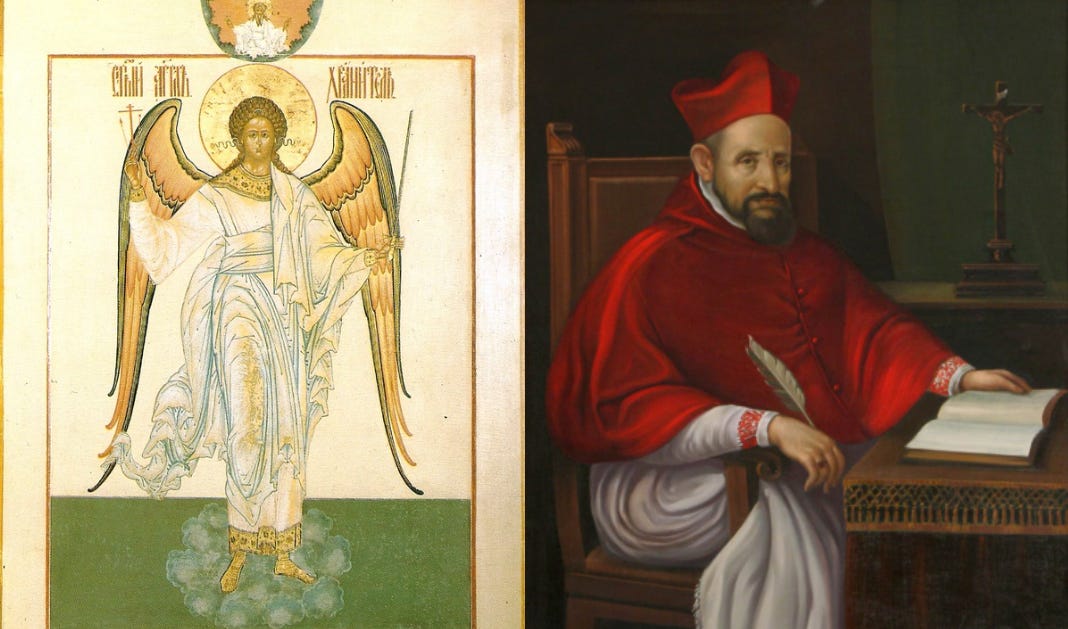Later this week is the feast of the Guardian Angels (October 2nd to be precise). This feast was added to the Roman calendar by Pope Paul V in the year 1615.
A beautiful Latin hymn about Guardian Angels is included in Vespers for the feast. That hymn is often referred to by its opening words, “Custodes Hominum.”
(This YouTube video features a choral setting of the hymn — I wanted to include a recording that was strictly Gregorian chant, but I struggled to find one online.)
Authorship of the hymn is attributed to St. Robert Bellarmine.
Bellarmine was a Jesuit cardinal, renowned for his robust intellect. He lived from 1542 to 1621. He wrote extensively in response to Protestantism. (Interestingly enough, he was also involved in the Galileo controversy. His role in that was very interesting, but it’s outside the scope of what I want to talk about today.)

Without further ado, here’s the hymn, with my original prose translation for each stanza.1
Custodes hominum psallimus Angelos,
naturae fragili quos Pater addidit
caelestis comites, insidiantibus
ne succumberet hostibus.
We sing about men’s guardians, the angels,
whom the Father attached to our fragile nature
as heavenly companions, lest it
succumb to the enemies.
Nam, quod corruerit proditor angelus,
concessis merito pulsus honoribus,
ardens invidia, pellere nititur
quos caelo Deus advocat.
For, because the traitor-angel fell,
driven away deservedly from his abandoned honors,
burning with hatred, he strives to defeat
those whom God calls to heaven.Huc, custos, igitur pervigil advola,
avertens patria de tibi credita
tam morbos animi, quam requiescere
quidquid non sinit incolas.
Therefore, fly here, oh sleepless guardian,
driving out from the homeland entrusted to you
both sicknesses of mind and whatever
does not allow inhabitants to rest.Sanctae sit Triadi laus pia iugiter,
cuius perpetuo numine machina
triplex haec regitur, cuius in omnia
regnat gloria saecula. Amen.
To the Holy Trinity be pious praise constantly,
By whose perpetual divine power this
threefold construction is guided, whose glory
reigns into all the ages. Amen.
The hymn is in a classical meter (one of the Asclepiadeans, to be more specific). Partly, that means the meter is based on strict rules involving long and short syllables, rather than a loose arrangement of stressed and unstressed syllables.
In other words, the classical meters are based on clearly defined rules of rhythmic quantity — syllables are deemed mathematically “long” or “short” according to predefined rules, with little room for modification.
The final stanza alludes to “this threefold construction.” The phrase is a reference to God’s Creation. It’s not clear to me exactly what this means.
I have three ideas for what it might mean.
Perhaps “this threefold construction” is Creation as a whole, as divided into Heaven, Earth, and Hell.
It could be referring to the earth around us, as divided into land, sea, and sky.
Or maybe it’s talking about the human person, through some system by which the human person could be said to have three parts.
I’m leaning toward that first interpretation myself, but the other two also seem plausible. Perhaps someone more knowledgeable could crack the code and tell me what the phrase means exactly.
This hymn is quite beautiful, intelligent and ornate in its own way, while at the same time being relatively easy to translate. The only section I struggled with in terms of grammar was the latter half of the third stanza. I guess you could say it strikes a nice balance, being neither too easy nor too difficult overall — thoroughly poetic, without being oblique.
In addition to being a man of piety, generosity, and sanctity, St. Robert Bellarmine was also a man of great intellect and learning. Both sides of the coin — both his holiness and his intelligence — are evidenced in this hymn.
That’s all I’ve got for this post. Thank you for reading!





Regarding the "machina triplex", I found a seemingly relevant passage: "When explaining the second petition of the Lord’s Prayer, Bellarmine closely follows the Tridentine Catechism and reproduces its threefold understanding of God’s kingdom." (https://www.academia.edu/37770869/The_Natural_Kingdom_of_God_in_Hobbess_Political_Thought_History_of_European_Ideas_) You might want to check the source: Robert Bellarmine, De bonis operibus in particulari, in Ven. Cardinalis Roberti Bellarmini Politiani S.J. Opera omnia (hereafter Opera omnia), vol. 6, ed. Justinus Fèvre (Paris: Vivès, 1873).